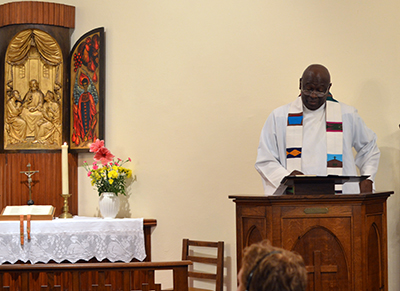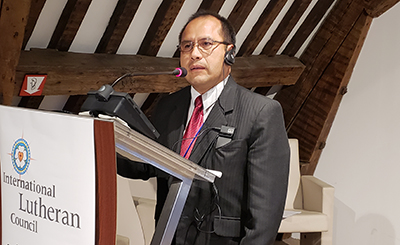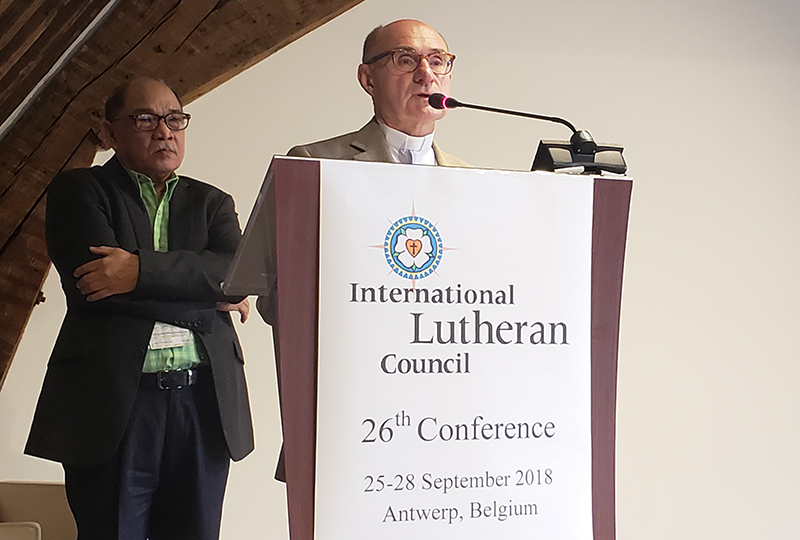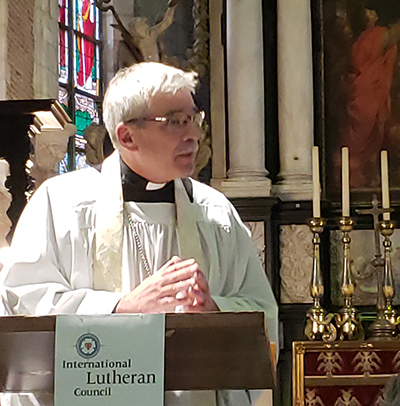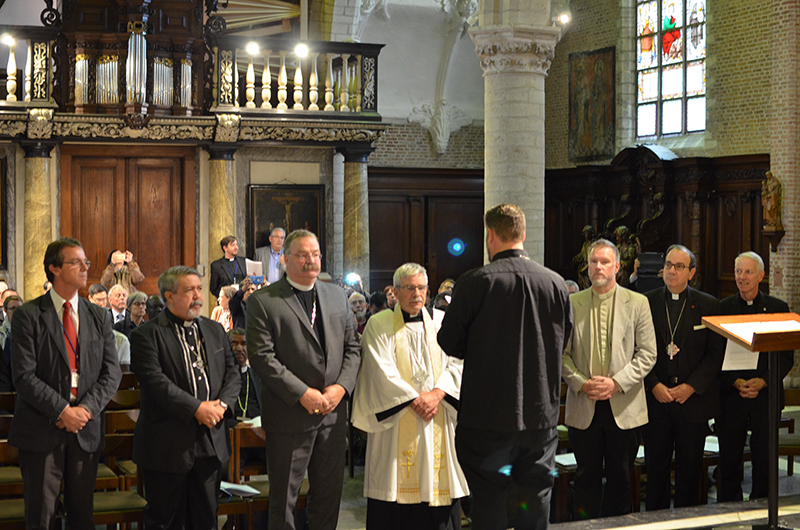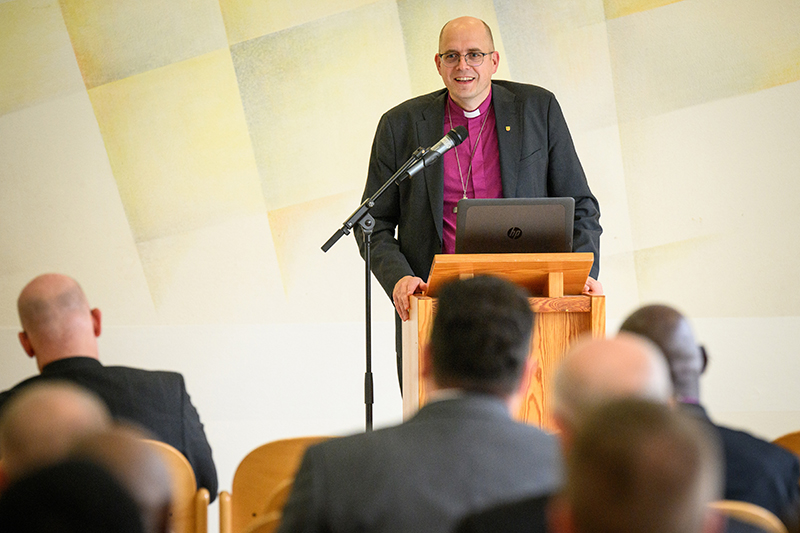
WITTENBERG – As anniversary celebrations for the International Lutheran Council (ILC) drew to a close on October 14 in Wittenberg, Germany, the ILC released a new statement affirming its commitment to the authority of Holy Scripture, over and against the changing mores of contemporary society.
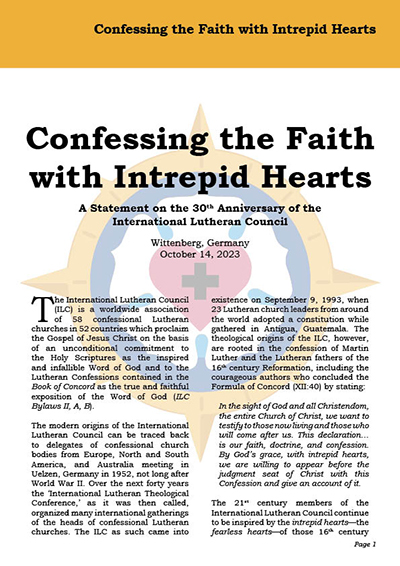
ILC Chairman Juhana Pohjola, Bishop of the Evangelical Lutheran Mission Diocese of Finland, publicly read the statement—entitled “Confessing the Faith with Intrepid Hearts”—near the end of proceedings. “We expect churches of the ILC, and exhort churches not of the ILC, to retain, confess, and put into action the godly, wise, and beautiful way of life revealed in Holy Scripture,” the document states. “During these dark and later days, the world is being overwhelmed by a culture of ugliness and death which is increasingly promoted and enforced by civil authorities, even in opposition to freedom of religion and religious speech. Therefore, the ILC must continue to embrace and fearlessly proclaim God the Father’s biblical pattern of holiness, truth, and beauty which is enlivened by the atoning forgiveness of Jesus Christ and sustained by the Holy Spirit through the preaching of the Word, and the administration of Holy Baptism and the Sacrament of Jesus’ Body and Blood.”
The statement reaffirms the ILC’s unwavering commitment that “that the Holy Scriptures not only guide doctrine but the life and morals of the Church.” The statement particularly highlights the ILC’s adherence to historic Christian teaching on issues related to the taking of human life; to marriage and human sexuality; to interchurch fellowship; to ordination; and more.
It further reaffirms its adherence to “an even greater and more blessed teaching of the Bible”—namely, the proclamation of “Jeus and the Gospel of forgiveness of sins by God’s grace alone, through faith in the atoning life, death, and resurrection of Christ alone.”
The document is available for download here. The full text of the statement also appears below.
———————
Confessing the Faith with Intrepid Hearts
A Statement on the 30th Anniversary of the International Lutheran Council
Wittenberg, Germany
October 14, 2023
The International Lutheran Council (ILC) is a worldwide association of 58 confessional Lutheran churches in 52 countries which proclaim the Gospel of Jesus Christ on the basis of an unconditional commitment to the Holy Scriptures as the inspired and infallible Word of God and to the Lutheran Confessions contained in the Book of Concord as the true and faithful exposition of the Word of God (ILC Bylaws II, A, B).
The modern origins of the International Lutheran Council can be traced back to delegates of confessional church bodies from Europe, North and South America, and Australia meeting in Uelzen, Germany in 1952, not long after World War II. Over the next forty years the ‘International Lutheran Theological Conference,’ as it was then called, organized many international gatherings of the heads of confessional Lutheran churches. The ILC as such came into existence on September 9, 1993, when 23 Lutheran church leaders from around the world adopted a constitution while gathered in Antigua, Guatemala. The theological origins of the ILC, however, are rooted in the confession of Martin Luther and the Lutheran fathers of the 16th century Reformation, including the courageous authors who concluded the Formula of Concord (XII:40) by stating:
In the sight of God and all Christendom, the entire Church of Christ, we want to testify to those now living and those who will come after us. This declaration…is our faith, doctrine, and confession. By God’s grace, with intrepid hearts, we are willing to appear before the judgment seat of Christ with this Confession and give an account of it.
The 21st century members of the International Lutheran Council continue to be inspired by the intrepid hearts—the fearless hearts—of those 16th century confessors who signed the Formula of Concord. The same spirit is alive today as the ILC celebrates its 30th anniversary under the theme “Confessing the Faith with Intrepid Hearts.”
The ILC remains committed in word and action to the confessional basis and purpose articulated in its Constitution (Articles II and III) and Bylaws (Article II). We expect churches of the ILC, and exhort churches not of the ILC, to retain, confess, and put into action the godly, wise, and beautiful way of life revealed in Holy Scripture. During these dark and later days, the world is being overwhelmed by a culture of ugliness and death which is increasingly promoted and enforced by civil authorities, even in opposition to freedom of religion and religious speech. Therefore, the ILC must continue to embrace and fearlessly proclaim God the Father’s biblical pattern of holiness, truth, and beauty which is enlivened by the atoning forgiveness of Jesus Christ and sustained by the Holy Spirit through the preaching of the Word, and the administration of Holy Baptism and the Sacrament of Jesus’ Body and Blood.
Thus, at this anniversary we re-affirm: “The Holy Scriptures not only guide doctrine but the life and morals of the Church” (Bylaws II, D). As a result, we assert the following truths:
- The Fifth Commandment against murder prohibits any deliberate harm of innocent human life, including abortion and euthanasia (cf. Bylaws II, D, 1, a).
- The Sixth Commandment against adultery affirms that marriage was created by God from the beginning as the life-long union of one man and one woman and for the procreation and nurture of children. Only within marriage are conjugal relations pleasing to God (cf. Bylaws II, D, 1, b). In recent years the so-called “Culture Wars” have seen attempts to re-define marriage and what it means to be human as male and female. Holy Scripture teaches that “God created man in His own image… male and female He created them” (Genesis 1:27). Natural law concurs.
- “Altar and pulpit fellowship between church bodies is only possible where there is a common confession of faith based on the Word of God. Where there are disagreements between church bodies regarding the Word of God, we shall not pretend that these divisions are unimportant or give a false witness of unity by practicing altar or pulpit fellowship” (cf. Bylaws II, D, 2, a).
- Concerning the Office of the Ministry, we believe that while “all Christians—men and women—are redeemed and able to serve the Church in many ways, Holy Scripture requires that only men who are spiritually qualified in life and doctrine are to be called and ordained as pastors to preach the gospel and administer the sacraments” (Bylaws II, D, 2, b).
These certainly are not the only teachings of Holy Scripture, but these are particularly misunderstood, challenged, and rejected in our day, and so must be all the more boldly confessed by those who hold fast the Bible and the Lutheran Confessions.
There is, indeed, an even greater and more blessed teaching of the Bible, which we cling to above all things. This 30th anniversary celebration is taking place at St. Mary’s City Church in Wittenberg where Martin Luther preached. Luther was not only a professor at the University of Wittenberg, he was also called as a preacher to St. Mary’s parish. His reform of the mass drew upon his brilliant linguistic, musical, and liturgical skill. However, it was motivated primarily by the biblical doctrine of justification by grace. Whether in the church or the classroom, Luther proclaimed Jesus and the Gospel of forgiveness of sins by God’s grace alone, through faith in the atoning life, death, and resurrection of Christ alone.
This is the chief doctrine of the Bible by which the Church stands or falls. In this teaching each Christian lives as he or she receives forgiveness in word, water, bread, and wine. It is fitting that the celebration of this 30th anniversary begins where this Chief Article of Justification was re-discovered, clearly preached, confessed, and sung with intrepid hearts. The ILC therefore supports its member churches in preaching the Gospel to the entire world and at the same time furthers “united diaconal action through intentional acts and programs of mercy in response to human need and suffering” (Bylaws II.2).
“I charge you in the presence of God and of Christ Jesus, who is to judge the living and the dead, and by His appearing and His kingdom: preach the word; be ready in season and out of season; reprove, rebuke, and exhort, with complete patience and teaching.”
– 2 Timothy 4:1-2 –
Issued on Behalf of the International Lutheran Council by its Board of Directors
Chairman: Bishop Juhana Pohjola
Evangelical Lutheran Mission Diocese of Finland
Secretary: Bishop/President John Donkoh
Evangelical Lutheran Church of Ghana
Africa: Archbishop Joseph Ochola Omolo
Evangelical Lutheran in Kenya
Asia: President Antonio Reyes
Lutheran Church in the Philippines
Europe: Chairman George Samiec
Evangelical Lutheran Church of England
Latin America: President Alceu Alton Figur
Evangelical Lutheran Church of Paraguay
North America: President Timothy Teuscher
Lutheran Church–Canada
Appointed: Rev. Dr. Robert Bugbee
Lutheran Church–Canada
Appointed: President Matthew C. Harrison
The Lutheran Church—Missouri Synod
General Secretary: Rev. Dr. Timothy C.J. Quill
International Lutheran Council
———————

